- Home
- Roald Dahl
The Vicar of Nibbleswicke
The Vicar of Nibbleswicke Read online
Roald Dahl
* * *
THE VICAR OF NIBBLESWICKE
ILLUSTRATED BY QUENTIN BLAKE
Contents
Foreword
The Vicar of Nibbleswicke
Read More
ROALD DAHL was a spy, ace fighter pilot, chocolate historian and medical inventor. He was also the author of Charlie and the Chocolate Factory, Matilda, The BFG and many more brilliant stories. He remains THE WORLD’S NUMBER ONE STORYTELLER.
QUENTIN BLAKE has illustrated more than three hundred books and was Roald Dahl’s favourite illustrator. In 1980 he won the prestigious Kate Greenaway Medal. In 1999 he became the first ever Children’s Laureate and in 2013 he was knighted for services to illustration.
Foreword
When I first, at the invitation of Tom Maschler of Jonathan Cape, produced a set of sample drawings for Roald Dahl’s book The Enormous Crocodile, it had not occurred to me – I don’t think it had occurred to any of us – that we were embarking on a collaboration that would extend over fifteen years and a dozen books. It’s a collaboration of which I am proud and of which I have a lot of memories.
Memories, of course, of discussion of pictures, of the subjects for pictures, of the interpretation of characters; most often carried out in the sympathetic atmosphere of Gipsy House, in the midst of the Dahl family. But other associated memories too, such as those Christmas readings which Roald used to give at the National Theatre. His audience filled one of the great auditoriums – the Lyttleton or the Olivier – but nevertheless Roald, rooting in his old leather briefcase for the pages of an as-yet-unpublished story, seemed perfectly at ease; perfectly able to talk as though he were talking to each person individually. And, after the performance, the signing of books. No children’s author can surely have signed as many books as Roald Dahl: the queue of the National Theatre would be across the foyer and down the stairs; and though it might take two hours, everyone had a word and a signature. This concern for his readers and readiness to be available to them didn’t end there. There were, for instance, replies to thousands of letters, both to children and teachers, with specially-written poems regularly renewed; and endless visits to schools and libraries.
And as well as generosity with time there were other kinds of generosity, works and gifts for charities and other institutions. They were private, not much talked about. But Roald had asked me to assist him in one or two projects for charity – a Christmas card for Great Ormond Street Hospital, for instance – and so it wasn’t altogether a surprise to hear that familiar voice on the telephone, early last year, asking me if I’d be prepared to illustrate something that he was writing for the Dyslexia Institute. What was surprising was to hear what was being offered: the auction of all rights, worldwide, for the period of copyright. It’s a privilege to be associated, among our many collaborations, with Roald in this book; a landmark of both his concern for people and his passionate belief in the importance of reading.
1991
Once upon a time there lived in England a charming and God-fearing vicar called the Reverend Lee. When as a young man he first came to take up his duties in the small village of Nibbleswicke, there was for a while utter confusion and often genuine consternation among his devout parishioners.
What had happened was this: as a boy, Robert Lee had suffered from severe dyslexia. However, guided by the Dyslexia Institute in London and helped by some excellent teachers, Robert made such splendid progress that by the time he was eighteen his writing and reading were both more or less normal and he was able to gratify his ambition to go into training for the ministry.
All went well and by the time he was twenty-seven Robert Lee had become the Reverend Lee and had been appointed to his first important job as Vicar of Nibbleswicke.
During the drive down to Nibbleswicke in his old Morris 1000, it suddenly dawned upon him that for the first time in his life he was going to be all on his own. He began to get nervous. Would he be equal to running a parish? The previous vicar, as he knew, had died in harness and there would be nobody there to guide him.
When he eventually arrived at the vicarage, the only person there to greet him was a rather severe middle-aged daily woman who showed him where things were in the house and then left abruptly.
Oh dear, thought poor Robert Lee as he lay in bed that night trying to sleep. Will I really be able to cope with this job? Weddings, funerals, christenings, Sunday Schools, the organist, the verger, the church committee, the choir, the bell-ringers and, above all, the dreaded sermons … His mind whirled. He began to sweat.
And it is clear now that sometime during that horrible night something must have gone click in his brain and stirred up in some way vestiges of the old dyslexia that was lying there dormant, because the next morning when he got up he was suffering, although he did not know it himself at the time, from a very peculiar illness. It wasn’t dyslexia, but it was clearly related in some way to those old dyslexic problems. The way it affected him was as follows:
He would be talking to somebody and suddenly his mind would subconsciously pick out the most significant word in the sentence and reverse it. By that I mean he would automatically spell the word backwards and speak it in that way without even noticing what he had done. For example: trap became part, drab became bard, God became dog, spirit became tirips and so on. I repeat that he was not aware of what he was doing and therefore he never thought to correct himself.
When the Reverend Lee got up on that first morning, he found a note left by the verger on his desk politely suggesting that he make a start in his new parish by calling right away upon the wealthiest and most fervent supporter of the church in Nibbleswicke. This, the note added, was a maiden lady by the name of Miss Arabella Prewt. Miss Prewt had recently footed the bill for one hundred new hassocks for the church, each one filled with sponge rubber, which was very easy on the knees, and the verger hinted that if the vicar played his cards right, the lady might be good for an even larger donation in the near future.
Very well, the Reverend Lee told himself, I’d better call on Miss Prewt right away; and he decided, so as to appear more friendly and informal, to leave off his dog-collar and to dress in mufti.
Setting off on foot, he soon found Miss Prewt’s large Edwardian house, which was called ‘The Haven’, and he rang the bell. The door was opened by Miss Prewt herself, a tall, thin female who stood bolt upright and whose mouth was like the blade of a knife.
‘My dear Miss Twerp!’ cried the Reverend Lee. ‘I am your new rotsap! My name is Eel, Robert Eel.’
A small black and white dog appeared between Miss Prewt’s legs and began to growl. The Reverend Lee bent down and smiled at the dog. ‘Good god,’ he said. ‘Good little god.’
‘Are you mad?” shouted Miss Prewt. ‘Who are you and what do you want?’
‘I am Eel, Miss Twerp!’ cried the vicar, extending his hand. ‘I am the new rotsap, the new raciv of Nibbleswicke! Dog help me!’
Miss Prewt slammed the door in his face.
Things went from bad to worse. Soon the entire village was convinced that the new vicar was completely barmy. Pleasant and harmless, they said, but completely and utterly barmy.
On one occasion the Reverend Lee walked into the village hall, where the local ladies were holding their weekly knitting session, knitting sweaters for sailors in the Merchant Navy.
‘How lovely!’ he cried. ‘How clever you all are! Each of you stink!’
Matters came to a head on the following Saturday when the Reverend Lee met a small group of women who he was supposed to be preparing for their First Communion.
‘The only thing I’m not sure about,’ said Mrs Purgativa, ‘is whether you are supposed actually to d
rink the wine when the chalice is offered to you. If so, how much should one drink? What I mean is, should it be a good gulp or just a little sip?’
‘Dear lady,’ cried the vicar, ‘you must never plug it! If everyone were to plug it the cup would be empty after about four goes and the rest of you wouldn’t get any at all! What you must do is pis. Pis gently. All of you, all the way along the rail must pis, pis, pis. Do you understand what I mean?’
They didn’t, and the meeting broke up in disorder. Yet the Reverend Lee was too nice and gentle a man for anyone to bear any deep malice towards him. They couldn’t believe he was being deliberately obscene. There was something wrong somewhere but none of them could say what it was.
Then came the first Sunday morning service, a great occasion for the village and a greater one for the vicar. The service turned out to be an amusing business because the vicar kept peppering his sentences with the most extraordinary words. They weren’t obscene, nor did these words turn themselves into other words that meant anything at all; except in the case of one or two, like ‘dog’ for ‘God’. Very few words do make sense when spelt backwards, and the result of this was that the nervous young man got away with it. In fact, most of the congregation found the zany word-crazy service a rather welcome change from the old routine of well-worn phrases. It was rather fun for instance to hear him intoning ‘and forgive us our sessapsert as we forgive those that ssapsert against us’ rather than the other old thing. So on the whole the service went well and was voted very jolly indeed. Everyone was pleased with the new eccentric young vicar.
Then came the bombshell. When the service was over and ‘the blessing of Dog Almighty’ had been given, the vicar stepped forward to the front of the altar rail and spoke as follows:
‘Dear people, it is hardly my place as a newcomer to start making rules so early in my incumbency, but there is just one thing I feel I must mention. The road outside our little church is exceedingly narrow and, as you know, there is hardly room for two vehicles to pass each other. Therefore I feel it only right to ask members of the congregation not to krap all along the front of the church before the service. It is not only unsightly but it is also dangerous. If you all krap at the same time all along the side of the road you could be hit by a passing car at any time. There is plenty of room for you to do this alongside the church on the south side if you feel you must.’
The silence that greeted this announcement was like the end of the world and the poor vicar walked out of the church with not one kindly eye looking up to meet his.
In the end it was the local doctor who guessed what was wrong. ‘What you’ve got,’ he said, ‘is a very rare disease called Back-to-Front Dyslexia. It is very common among tortoises, who even reverse their own name and call themselves esio trots. Fortunately,’ went on the good doctor, ‘there is a simple cure.’
‘Tell me!’ cried the vicar. ‘Oh please tell me!’
‘You must walk backwards while you are speaking, then these back-to-front words will come out frontwards or the right way round. It’s common sense.’
The cure worked miraculously. There were problems, of course. The main one was that the poor chap couldn’t see where he was going without twisting his head over his shoulder, which was painful. But by attaching a small rear-view mirror to his forehead with an elastic band, he overcame this difficulty.
Sermons were also awkward, but the congregation very soon grew accustomed to seeing their vicar walking backwards round and round the pulpit while he was preaching. In fact, it added a nice crazy touch to what was normally a dreary proceeding.
In the end, the Reverend Robert Lee got so good at walking backwards that he never walked forwards at all, and for the rest of his life he became a lovable eccentric and a pillar of the parish.
Books by Roald Dahl
THE BFG
BOY: TALES OF CHILDHOOD
BOY and GOING SOLO
CHARLIE AND THE CHOCOLATE FACTORY
CHARLIE AND THE GREAT GLASS ELEVATOR
THE COMPLETE ADVENTURES OF CHARLIE AND MR WILLY WONKA
DANNY THE CHAMPION OF THE WORLD
GEORGE’S MARVELLOUS MEDICINE
GOING SOLO
JAMES AND THE GIANT PEACH
MATILDA
THE WITCHES
FOR YOUNGER READERS
THE ENORMOUS CROCODILE
ESIO TROT
FANTASTIC MR FOX
THE GIRAFFE AND THE PELLY AND ME
THE MAGIC FINGER
THE TWITS
PICTURE BOOKS
DIRTY BEASTS (with Quentin Blake)
THE ENORMOUS CROCODILE (with Quentin Blake)
THE GIRAFFE AND THE PELLY AND ME (with Quentin Blake)
THE MINPINS (with Patrick Benson)
REVOLTING RHYMES (with Quentin Blake)
PLAYS
THE BFG: PLAYS FOR CHILDREN (Adapted by David Wood)
CHARLIE AND THE CHOCOLATE FACTORY: A PLAY (Adapted by Richard George)
DANNY THE CHAMPION OF THE WORLD: PLAYS FOR CHILDREN (Adapted by David Wood)
FANTASTIC MR FOX: A PLAY (Adapted by Sally Reid)
JAMES AND THE GIANT PEACH: A PLAY (Adapted by Richard George)
THE TWITS: PLAYS FOR CHILDREN (Adapted by David Wood)
THE WITCHES: PLAYS FOR CHILDREN (Adapted by David Wood)
TEENAGE FICTION
THE GREAT AUTOMATIC GRAMMATIZATOR AND OTHER STORIES
RHYME STEW
SKIN AND OTHER STORIES
THE VICAR OF NIBBLESWICKE
THE WONDERFUL STORY OF HENRY SUGAR AND SIX MORE
COLLECTIONS
THE ROALD DAHL TREASURY
SONGS AND VERSE
Your story starts here …
Do you love books and discovering new stories?
Then puffin.co.uk is the place for you. . .
• Thrilling adventures, fantastic fiction and laugh-out-loud fun
• Brilliant videos featuring your favourite authors and characters
• Exciting competitions, news, activities, the Puffin blog and SO MUCH more. . .
puffin.co.uk
It all started with a scarecrow …
Puffin is over seventy years old. Sounds ancient, doesn’t it? But Puffin has never been so lively. We’re always on the lookout for the next big idea, which is how it began all those years ago.
Penguin Books was a big idea from the mind of a man called Allen Lane, who in 1935 invented the quality paperback and changed the world. And from great Penguins, great Puffins grew, changing the face of children’s books forever.
The first four Puffin Picture Books were hatched in 1940 and the first Puffin story book featured a man with broomstick arms called Worzel Gummidge. In 1967 Kaye Webb, Puffin Editor, started the Puffin Club, promising to ‘make children into readers’. She kept that promise and over 200,000 children became devoted Puffineers through their quarterly instalments of Puffin Post.
Many years from now, we hope you’ll look back and remember Puffin with a smile. No matter what your age or what you’re into, there’s a Puffin for everyone. The possibilities are endless, but one thing is for sure: whether it’s a picture book or a paperback, a sticker book or a hardback, if it’s got that little Puffin on it – it’s bound to be good.
www.puffin.co.uk
PUFFIN BOOKS
UK | USA | Canada | Ireland | Australia
India | New Zealand | South Africa
Puffin Books is part of the Penguin Random House group of companies whose addresses can be found at global.penguinrandomhouse.com.
www.penguin.co.uk
www.puffin.co.uk
www.ladybird.co.uk
First published in Great Britain by Century Books 1991
Published by Penguin Books 1992
Digital edition published 2017
Copyright © Random House UK Ltd and Penguin Books Ltd, 1991
The moral right of the author and illustrator has been asserted
Cover illustration copyrigh
t © Quentin Blake
ISBN: 978-0-141-38835-9
All correspondence to:
Puffin Books
Penguin Random House Children’s
80 Strand, London WC2R 0RL
Roald Dahl, The Vicar of Nibbleswicke
Thanks for reading the books on GrayCity.Net

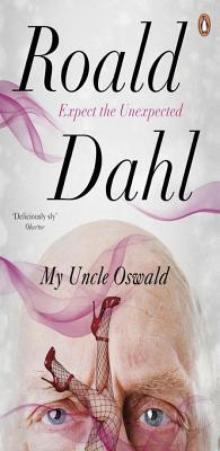 My Uncle Oswald
My Uncle Oswald The Best of Roald Dahl
The Best of Roald Dahl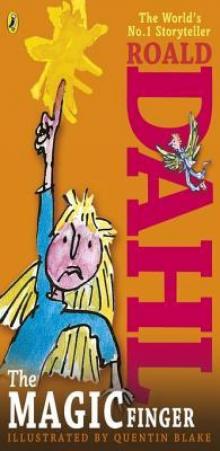 The Magic Finger
The Magic Finger Charlie and the Chocolate Factory
Charlie and the Chocolate Factory Fantastic Mr Fox
Fantastic Mr Fox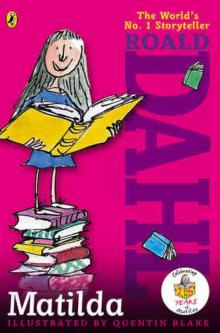 Matilda
Matilda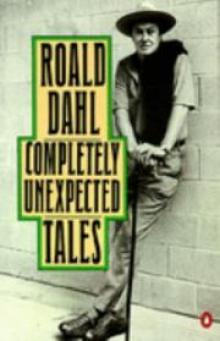 Completely Unexpected Tales: Tales of the Unexpected. More Tales of the Unexpected
Completely Unexpected Tales: Tales of the Unexpected. More Tales of the Unexpected The Wonderful Story of Henry Sugar and Six More
The Wonderful Story of Henry Sugar and Six More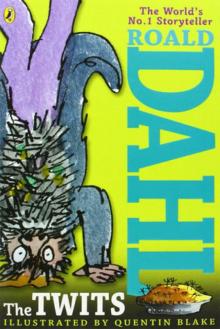 The Twits
The Twits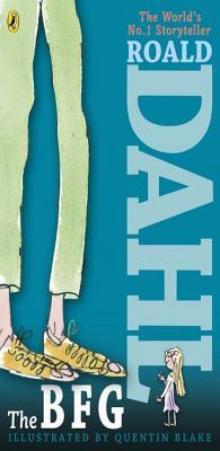 The BFG
The BFG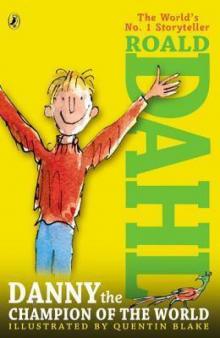 Danny the Champion of the World
Danny the Champion of the World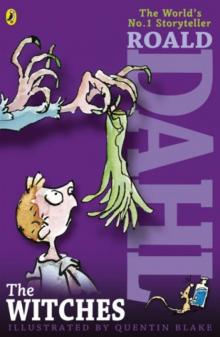 The Witches
The Witches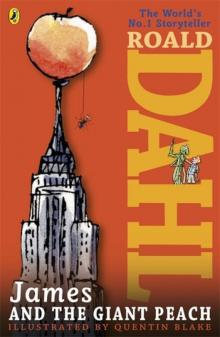 James and the Giant Peach
James and the Giant Peach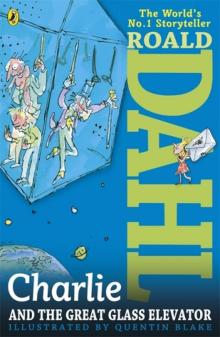 Charlie and the Great Glass Elevator
Charlie and the Great Glass Elevator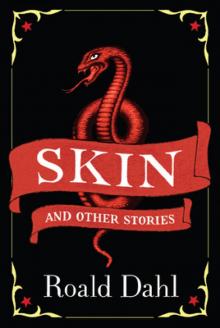 Skin and Other Stories
Skin and Other Stories Kiss Kiss
Kiss Kiss Switch Bitch
Switch Bitch The Giraffe and the Pelly and Me
The Giraffe and the Pelly and Me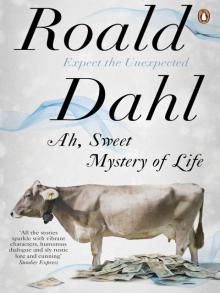 Ah, Sweet Mystery of Life
Ah, Sweet Mystery of Life Fear
Fear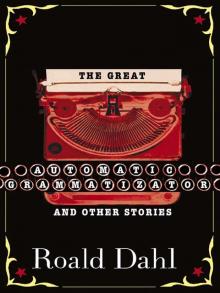 The Great Automatic Grammatizator and Other Stories
The Great Automatic Grammatizator and Other Stories Someone Like You
Someone Like You Charlie and the Great Glass Elevator c-2
Charlie and the Great Glass Elevator c-2 More About Boy
More About Boy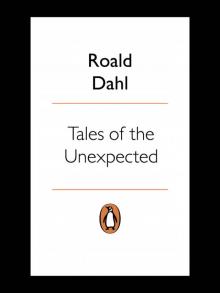 Tales of the Unexpected
Tales of the Unexpected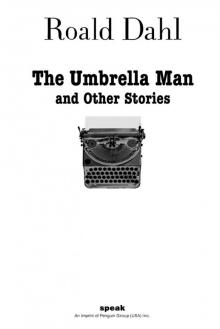 The Umbrella Man and Other Stories
The Umbrella Man and Other Stories Dirty Beasts
Dirty Beasts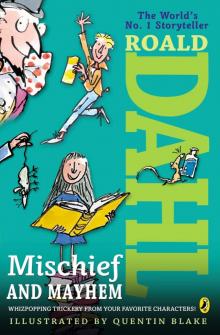 Roald Dahl's Mischief and Mayhem
Roald Dahl's Mischief and Mayhem The Collected Short Stories of Roald Dahl, Volume 1
The Collected Short Stories of Roald Dahl, Volume 1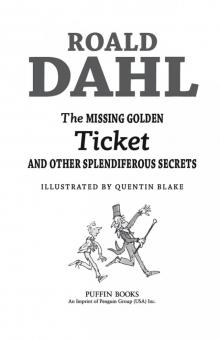 The Missing Golden Ticket and Other Splendiferous Secrets
The Missing Golden Ticket and Other Splendiferous Secrets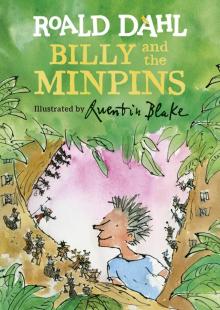 Billy and the Minpins
Billy and the Minpins Over to You
Over to You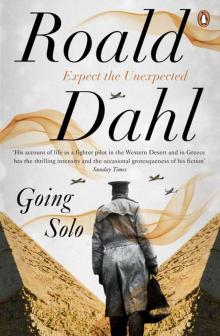 Going Solo
Going Solo Deception
Deception War
War Man from the South ee-3
Man from the South ee-3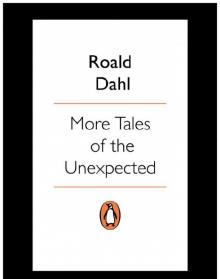 More Tales of the Unexpected
More Tales of the Unexpected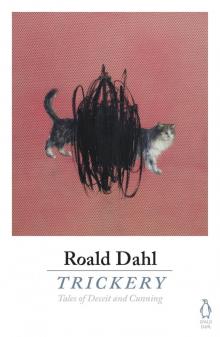 Trickery
Trickery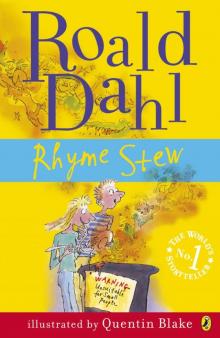 Rhyme Stew
Rhyme Stew Charlie and the Chocolate Factory (Puffin Modern Classics relaunch)
Charlie and the Chocolate Factory (Puffin Modern Classics relaunch)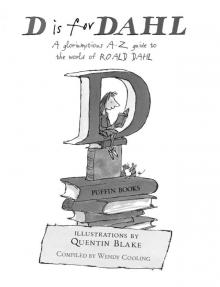 D is for Dahl
D is for Dahl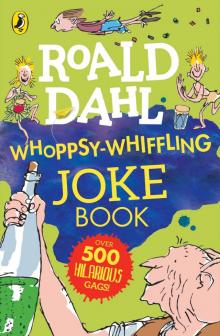 Roald Dahl Whoppsy-Whiffling Joke Book
Roald Dahl Whoppsy-Whiffling Joke Book Spotty Powder and other Splendiferous Secrets
Spotty Powder and other Splendiferous Secrets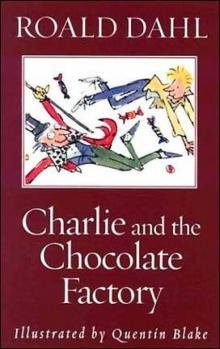 Charlie and the Chocolate Factory c-1
Charlie and the Chocolate Factory c-1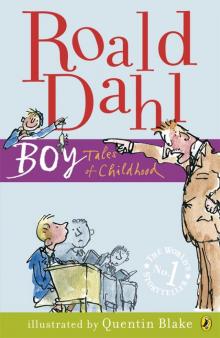 Boy
Boy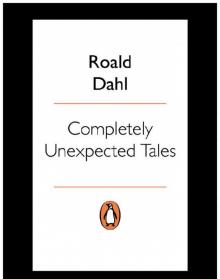 Completely Unexpected Tales
Completely Unexpected Tales Madness
Madness Innocence
Innocence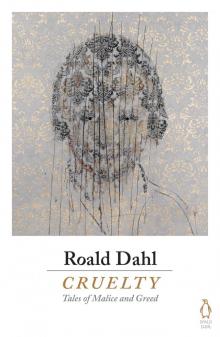 Cruelty
Cruelty George's Marvellous Medicine
George's Marvellous Medicine